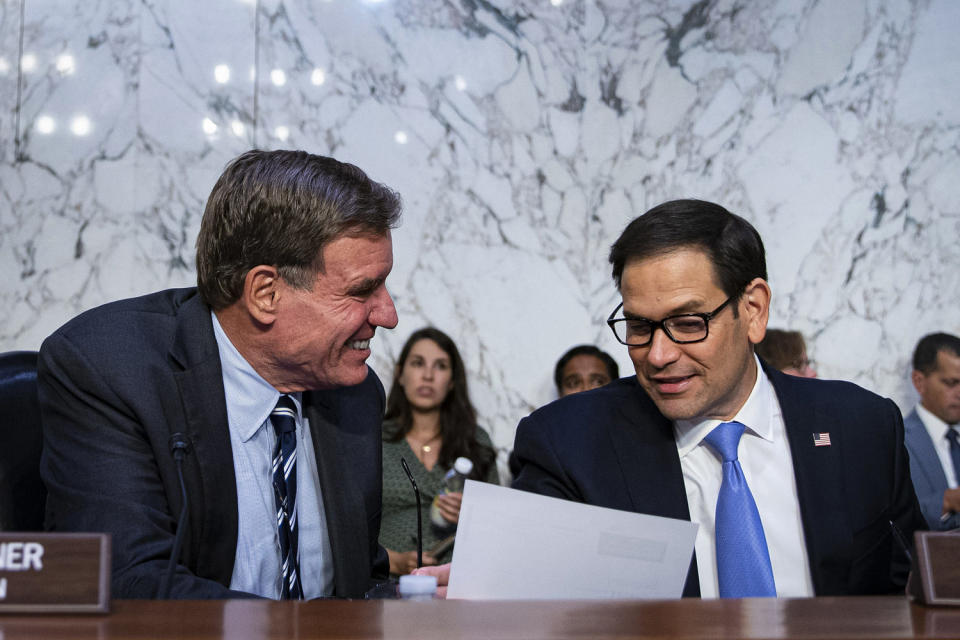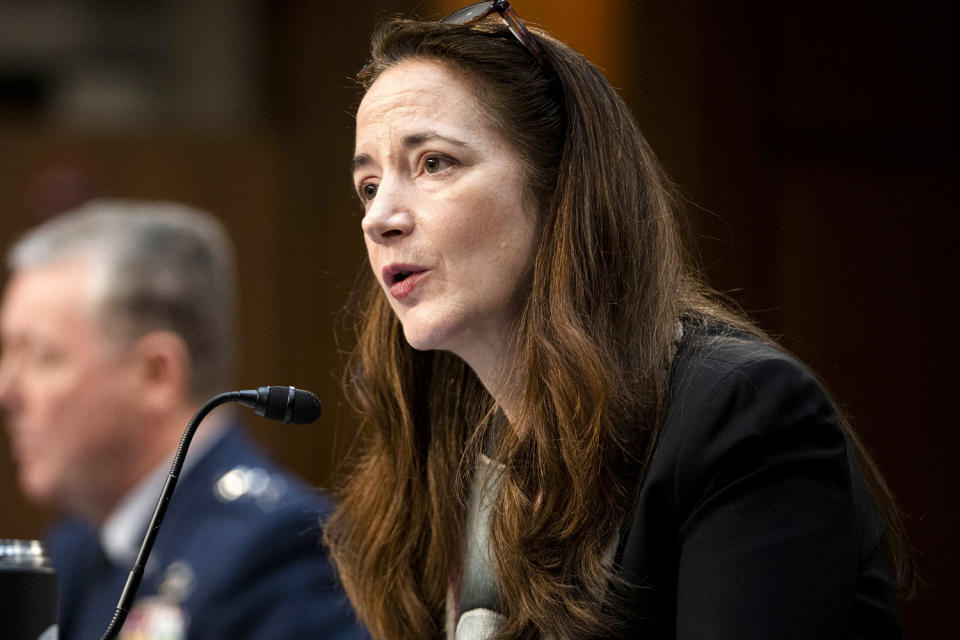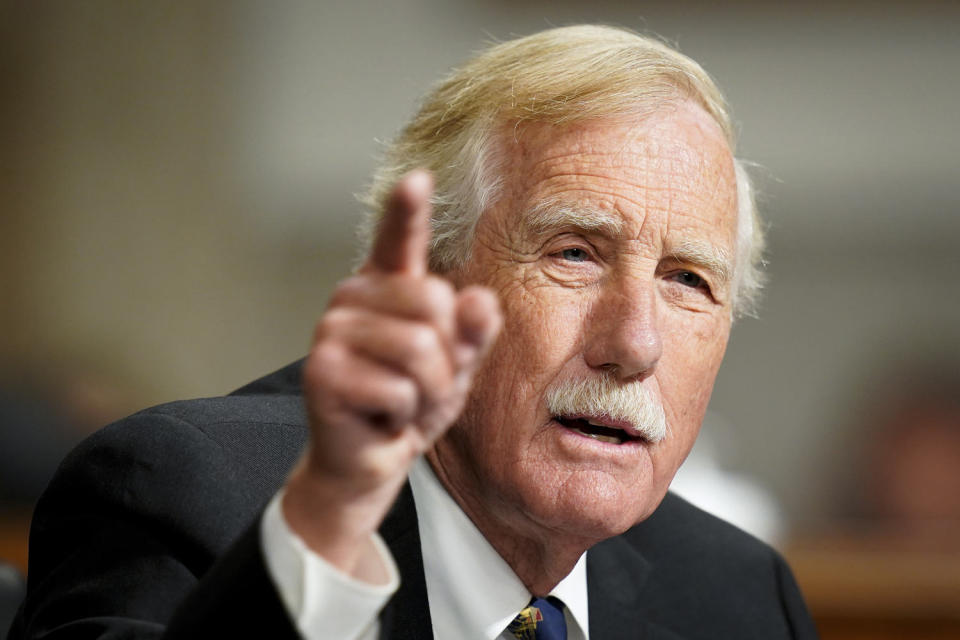Senators question whether the U.S. is ready to fight foreign election interference in 2024
- Oops!Something went wrong.Please try again later.
- Oops!Something went wrong.Please try again later.
Lawmakers on Wednesday warned of a growing threat of foreign interference in the 2024 election and questioned whether U.S. agencies — and tech companies — are sufficiently prepared to respond to the danger.
“We’ve got to do a better job of making sure Americans of all political stripes understand what is very probably coming their way over the next … less than six months,” said Senate Intelligence Committee Chair Sen. Mark Warner during a hearing with the head of U.S. intelligence and other senior officials.
The Virginia Democrat warned that attempts by Russia and other adversaries to try to influence the 2024 election through propaganda and disinformation could be “more sophisticated and more aggressive in both scale and scope” than in previous years.

Warner said the threat had increased due to a combination of more advanced and available technology, aggressive foreign actors, a growing distrust of government among Americans, litigation that has made U.S. agencies reluctant to share threat information with social media companies and a failure by tech firms to decisively tackle the problem.
“Sadly, since 2022, we’ve also seen considerable disinvestment — and in certain cases, utter disinterest — in platform integrity efforts by leading social media companies,” Warner said. The senator was referring to social media firms cutting staff and scaling back efforts to moderate content deemed to be disinformation or hate speech.
The ranking Republican on the intelligence committee, Sen. Marco Rubio of Florida, said it was unclear what federal agency or official had the responsibility to respond if a foreign government spread falsehoods or posted an AI-generated “deep fake” during the election campaign.
“When this happens, if this happens, who’s in charge of responding to it? Have we thought through the process of what do we do when one of these scenarios occurs?” Rubio asked. “Because I don’t think I have a clear understanding of who’s in charge and how we would respond. Who would take the lead?”
The senator said there needed to be a coordinated plan for how to respond instead of what he called an “ad hoc” approach that has been used in the past.
Director of National Intelligence Avril Haines told senators that protecting the democratic process “from foreign influence or interference is an absolute priority for the intelligence community” and that the U.S. government “has never been better prepared to address the challenge.”
Haines said her office might have the role of issuing a warning about a foreign actor spreading disinformation during an election, but she said there might be instances where local or state election officials might be better placed to warn the public.

“The hesitation that you hear from me is based on the fact that there may be certain circumstances in which, for example, a state or local official or other basically public authorities are in a better position to make the public statement initially and for the rest of us to come back behind,” she said.
But Haines said she was prepared to promptly call out false information put out by foreign states, citing an example of what she said was a Russian-linked group putting out a video with false claims about a CIA plot to undermine Donald Trump’s bid for the White House. The baseless video claimed to describe an internet troll farm in Ukraine used by the CIA. The New York Times first reported on the Russian disinformation.
“And I am here to say, categorically, that this claim is patently false that there is no such thing. It is disinformation, and that is the kind of approach that we’ll continue to take across the board,” Haines said.
The intelligence director said the video was probably the work of a Russian-affiliated group known as Storm-1516.
A CIA spokesperson said the video was “patently false.”
“CIA is a foreign-focused organization that takes our obligation to remain uninvolved in American politics and elections very seriously,” spokesperson Walter Trosin said.
The threat picture for foreign interference is now more complex, Haines told lawmakers, because there are an increasing number of governments or groups seeking to shape the election outcome and more commercial firms ready to help them with sophisticated tools that can hide the original instigator.
“Russia remains the most active foreign threat to our elections,” Haines said.

The Russian government’s objective is to use information warfare to undermine faith in America’s democratic institutions, exacerbate divisions in the U.S. and weaken Western support for Ukraine, she said.
Although China seeks to promote support for Beijing’s policy stances, it did not try to shape the outcome of the last presidential election and would likely retain that approach as it is keen to avoid the fallout from being caught trying to meddle in a U.S. election, according to Haines.
Iran, however, “is becoming increasingly aggressive in their efforts seeking to stoke discord and undermine confidence in our democratic institutions as we’ve seen them do in prior election cycles,” she said.
Sen. Angus King of Maine said it was crucial that intelligence agencies move quickly to alert the public as soon as they identify a false piece of information, and to avoid slow-moving bureaucratic procedures that could play into the hands of those spreading disinformation.
King said that “if you have evidence that this is coming from a foreign source, let the public know so they can assess that.”
The Maine independent said he was concerned that cybersecurity officials might take an overly cautious approach to avoid being accused of trying to intervene in the election to help President Joe Biden get re-elected.
“I’m worried that you may be overly concerned with appearing partisan and that that will freeze you in terms of taking the actions that are necessary,” King said, and added: “Please ramp it up. We’ve got about six months and ... we know that these adversaries are going to be coming at us.”
Officials and lawmakers made a point of distinguishing between attempts by foreign actors to tamper with voting or ballot counting through cyberattacks, and separate efforts to influence attitudes and spread false information.
Despite revelations that Russia broke into American voter registration rolls in 2016, there is no indication that Moscow altered the registration records or other electoral systems.
Jen Easterly, director of the Cybersecurity and Infrastructure Security Agency, told the hearing that federal and state election agencies have bolstered the security of election systems over the past eight years.
“There is no evidence that malicious actors changed, deleted or altered votes or had any material impact on the outcome of any of these elections,” she said. But Easterly added: “We cannot be complacent.”
Russia, China and Iran have repeatedly denied they have tried to interfere in U.S. elections through propaganda, spreading disinformation or cyberattacks.
This article was originally published on NBCNews.com

